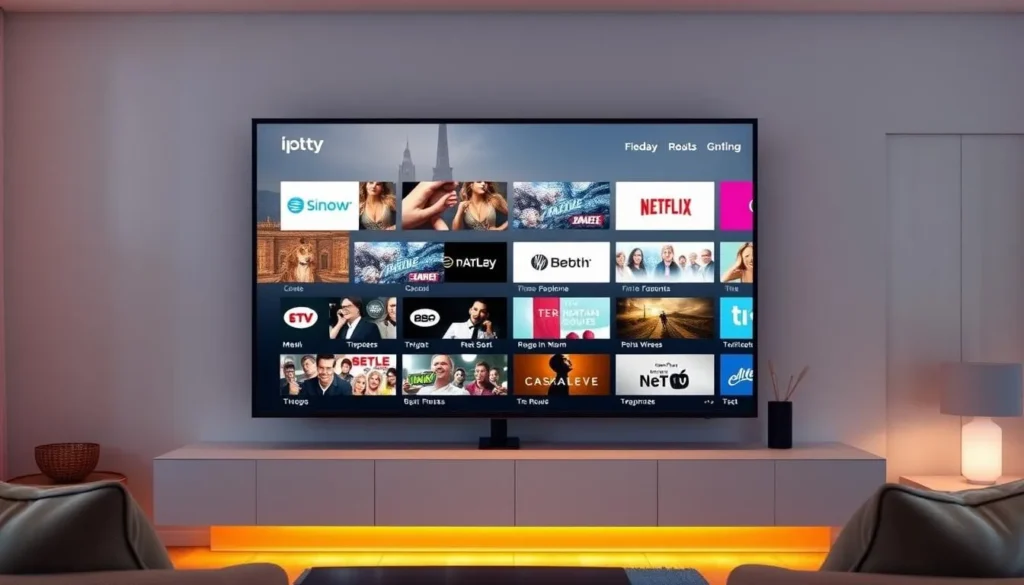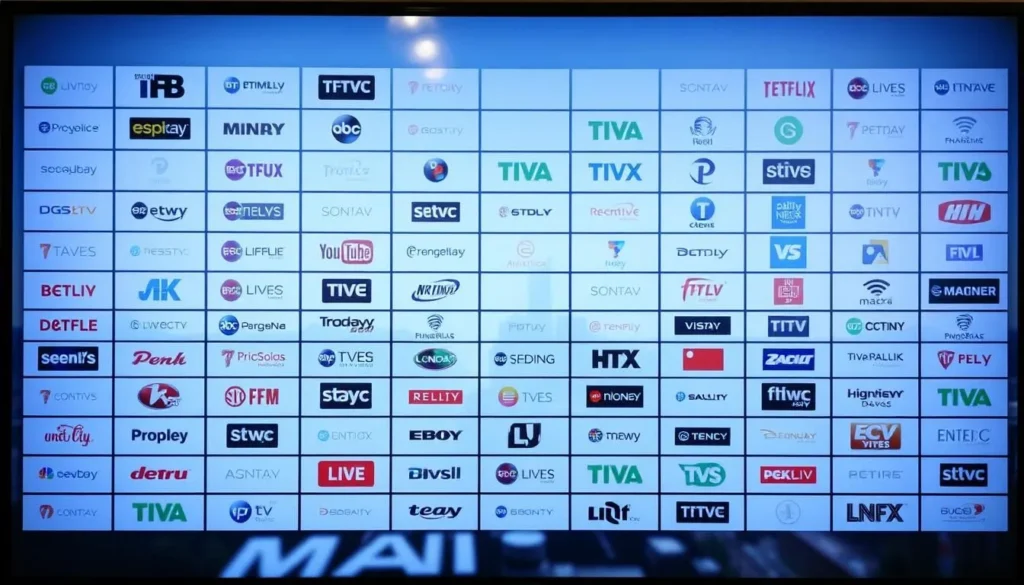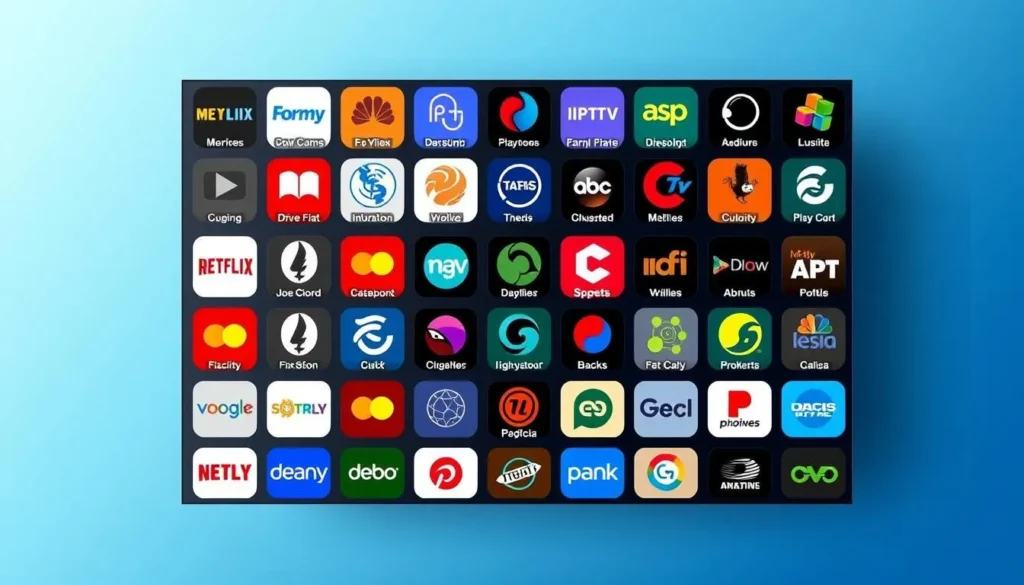IPTV, or Internet Protocol Television, has revolutionized the way we consume television content. With IPTV channel options expanding rapidly, users are now faced with a myriad of choices.
I will guide you through the intricacies of IPTV channel availability, helping you understand what to expect from your IPTV service.

The purpose of this guide is to provide clarity on the availability of channels on IPTV platforms, ensuring you have a comprehensive understanding of what IPTV can offer.
Key Takeaways
- Overview of IPTV and its channel offerings
- Understanding the factors that affect IPTV channel availability
- Tips for choosing the right IPTV service for your needs
- Exploring the variety of IPTV channel options
- What to expect from your IPTV service in terms of channel availability
Table of Contents
What Is IPTV and How Does It Work?
IPTV stands for Internet Protocol Television, a technology that enables television services to be delivered over the internet. This method allows for a more personalized and flexible viewing experience compared to traditional television services.

The Technology Behind IPTV
IPTV uses internet protocol to deliver television content. This is different from traditional cable or satellite TV, which relies on broadcast signals or dedicated cable infrastructure. IPTV works by streaming content directly to your device via the internet, allowing for a more interactive and customizable viewing experience.
The technology behind IPTV involves encoding television content into digital packets and transmitting these packets over a broadband internet connection. This process enables viewers to access a wide range of channels and on-demand content using various devices, including smart TVs, computers, and mobile devices.
How IPTV Differs from Traditional Cable and Satellite
One of the primary differences between IPTV and traditional cable or satellite TV is the delivery method. While traditional services rely on physical infrastructure like cables or satellite dishes, IPTV uses the internet. This difference allows IPTV to offer more flexibility, such as the ability to watch content on-demand and access a wider range of channels.
Additionally, IPTV services can be more cost-effective and offer better video quality, depending on the internet connection speed. The iptv channel lineup can also be more customizable, allowing users to select specific channels and content that interest them.
Common IPTV Delivery Methods
There are several common methods used to deliver IPTV services. These include:
- Live TV streaming
- Video on Demand (VOD)
- Time-shifted TV (catch-up TV)
These delivery methods provide users with a variety of options for accessing their favorite TV shows and movies. The flexibility in iptv channel selection is one of the key benefits of IPTV, making it an attractive option for many viewers.
Do We Get All Channels in IPTV? The Reality Explained
IPTV has revolutionized how we consume television, but the question remains: do we get all channels? The answer is complex and depends on several factors.
Factors Affecting Channel Availability
The availability of channels on IPTV services is influenced by multiple factors. These include the type of IPTV service, the service provider’s agreements with content providers, and the technology used to deliver the content.
Service Type: Different IPTV services offer varying channel lineups. Some may specialize in specific types of content, such as sports or international programming.

Regional Restrictions and Limitations
Regional restrictions play a significant role in determining the availability of channels on IPTV. Content licensing agreements often limit the distribution of certain channels or programs to specific geographic areas.
- Some channels may not be available due to regional sports blackouts.
- International channels might be restricted due to licensing agreements.
- Local channels may not be included in the IPTV channel list due to regional restrictions.
Content Licensing Challenges
Content licensing is a major challenge for IPTV providers. Securing the rights to broadcast certain channels or programs can be costly and complex.
IPTV providers must negotiate with content owners to include popular channels in their iptv channel packages. The cost and complexity of these negotiations can affect the availability of certain channels.
In conclusion, while IPTV offers a wide range of channels, it does not provide access to all channels. Understanding the factors that affect channel availability can help users make informed decisions when choosing an IPTV service.
Types of IPTV Services Available in the US
Understanding the different types of IPTV services available is crucial for making an informed decision when selecting a provider. The US IPTV market is diverse, offering various services that cater to different viewer preferences and needs.
Legal IPTV Providers
Legal IPTV providers operate within the bounds of copyright laws, offering licensed content to their subscribers. Examples include services like Sling TV and YouTube TV, which provide a range of channels and on-demand content. These providers often have agreements with content creators and distributors, ensuring a legitimate viewing experience.
Subscription-Based Services
Subscription-based IPTV services require users to pay a recurring fee for access to their content. These services often offer various packages with different channel lineups, catering to diverse viewer interests. AT&T TV Now is an example of a subscription-based service that provides live TV, on-demand content, and cloud DVR capabilities.

Free IPTV Options
Free IPTV options are available, though they often come with limitations. Some services may offer free content with advertisements, while others might provide a limited selection of free channels. It’s essential to be cautious when using free IPTV services, as some may operate in legal gray areas.
Hybrid IPTV Solutions
Hybrid IPTV solutions combine different technologies to deliver content. For example, some services might use a combination of IPTV and over-the-top (OTT) streaming to provide a more comprehensive viewing experience. These hybrid solutions can offer greater flexibility and a broader range of content options.
When choosing an IPTV service, it’s crucial to consider factors like channel offerings, pricing, and content quality to ensure the selected service meets your viewing needs.
Understanding IPTV Channel Packages
To get the most out of IPTV, it’s essential to understand the different channel packages on offer. IPTV services typically provide a variety of packages to cater to diverse viewer preferences.
Basic vs. Premium Packages
IPTV providers usually offer a range of packages, from basic to premium. Basic packages often include local channels and a limited selection of popular networks. In contrast, premium packages provide access to a broader range of channels, including premium content like sports and movie channels.
For instance, a basic package might include local news and entertainment channels, while a premium package could add sports channels like ESPN or HBO.
Sports and Entertainment Add-ons
Many IPTV services offer add-ons for sports and entertainment. These can include packages focused on specific sports, like NFL or MLB, or bundles that include premium entertainment channels.
“The flexibility to customize your channel lineup is a significant advantage of IPTV services,” notes industry experts. This allows viewers to tailor their viewing experience to their interests.
International Channel Options
One of the benefits of IPTV is the availability of international channels. Viewers can access content from around the world, including news, sports, and entertainment programs that might not be available through traditional TV services.
On-Demand Content Availability
In addition to live TV, many IPTV services offer on-demand content. This allows viewers to watch their favorite shows and movies at a time that suits them, rather than adhering to a broadcast schedule.
By understanding the different IPTV channel packages available, viewers can make informed decisions about their TV service, ensuring they get the content they want.
How to Research Available Channels Before Subscribing
Before committing to an IPTV service, it’s crucial to research the available channels to ensure they meet your viewing needs. This step is vital in making an informed decision about your TV viewing experience.
Using Provider Channel Lists
One of the first steps in researching IPTV channels is to review the provider’s channel list. Most IPTV services offer a list of available channels on their websites or upon request. I make sure to check this list to see if it includes the channels I’m interested in watching. It’s also essential to verify if the list is up-to-date, as channel lineups can change.
Requesting Free Trials to Test Channel Selection
Many IPTV providers offer free trials or temporary access to their services. I take advantage of these trials to test the channel selection and quality. During the trial period, I assess whether the channels are available as promised, the stream quality is satisfactory, and if the service meets my overall expectations.
Online Resources for IPTV Channel Information
In addition to provider channel lists, there are online resources and forums where users share their experiences and reviews of various IPTV services. I look for these resources to gain insights from other users about the channel offerings and any potential issues with the service.
Questions to Ask IPTV Providers
When considering an IPTV service, I prepare a list of questions to ask the provider about their channel offerings. Some key questions include: What channels are available? How often is the channel lineup updated? Are there any regional restrictions on certain channels? Are there additional costs for specific channels or packages? By asking these questions, I can get a clearer picture of what to expect from the service.
Evaluating IPTV Service Quality and Reliability
When selecting an IPTV service, it’s crucial to assess its overall quality and reliability to ensure a seamless viewing experience. Several key factors contribute to the quality and reliability of an IPTV service, including stream quality, server stability, customer support, and user interface.
Stream Quality and Resolution
The quality of the stream is vital for a satisfying viewing experience. Look for IPTV services that offer high-definition (HD) streaming and, if possible, 4K resolution. A good IPTV service should provide consistent and buffering-free streams. You can check the stream quality by testing the service during peak hours or asking for a free trial.
Server Stability and Uptime
Server stability is another critical factor. An IPTV service with high server uptime ensures that you can watch your favorite channels without interruptions. Research the provider’s infrastructure and read reviews to understand their server stability.
Customer Support Responsiveness
Responsive customer support is essential for resolving any issues that may arise. Evaluate the IPTV service’s support by checking their response times, available support channels (e.g., live chat, email, phone), and user reviews regarding their support experience.
User Interface and Experience
The user interface of the IPTV service should be intuitive and easy to navigate. A well-designed interface enhances your viewing experience by making it simple to find and watch your desired channels and content. Check if the service offers features like customizable channel lists and easy-to-use menus.
By carefully evaluating these aspects, you can choose an IPTV service that meets your needs and provides a reliable and high-quality viewing experience.
Setting Up Your IPTV Service for Optimal Viewing
Setting up your IPTV service correctly is key to an optimal viewing experience. To achieve this, you’ll need to consider several factors, including the necessary hardware and software, network optimization, and troubleshooting common issues.
Required Hardware and Software
To start, ensure you have the right equipment. This typically includes a compatible device such as a smart TV, streaming device, or set-top box. You’ll also need a stable internet connection with sufficient bandwidth to support your IPTV service. Some IPTV services may require specific apps or software; make sure to install the recommended player or application.
Step-by-Step Setup Guide
Follow these steps to set up your IPTV service:
- Configure your device or set-top box according to the manufacturer’s instructions.
- Install the IPTV app or software provided by your service provider.
- Enter your login credentials to access your IPTV service.
- Customize your channel list and preferences as needed.
- Test your connection to ensure it’s working correctly.
Optimizing Your Network for IPTV
For smooth IPTV streaming, a stable and fast internet connection is crucial. Consider upgrading your internet plan if you experience buffering or lag. Use a wired Ethernet connection instead of Wi-Fi for more stability. Additionally, minimize other devices’ bandwidth usage on your network while streaming IPTV.
Troubleshooting Common Issues
If you encounter problems, check your internet connection speed and stability first. Restart your device or set-top box to resolve minor glitches. If issues persist, contact your IPTV service provider’s customer support for assistance. Common problems include buffering, freezing, or channels not loading. Regularly updating your IPTV app or software can also help prevent issues.
“The quality of your IPTV experience largely depends on your setup and network configuration. Taking the time to optimize these aspects will significantly enhance your viewing pleasure.”
Legal Considerations When Using IPTV Services
Understanding the legal aspects of IPTV is essential for consumers to make informed decisions. As IPTV continues to grow in popularity, it’s crucial to navigate the legal landscape to avoid potential issues.
Copyright Laws and IPTV in the United States
Copyright laws in the US play a significant role in determining the legitimacy of IPTV services. IPTV providers must obtain proper licensing agreements with content creators to legally stream their channels. The Copyright Act of 1976 is a foundational law that protects original works, including television programs and movies distributed through IPTV.
To comply with copyright laws, IPTV services must secure rights from content owners. This involves negotiating licensing agreements that permit the distribution of copyrighted material. Failure to obtain these rights can result in legal action against the IPTV provider.
How to Identify Legal IPTV Providers
Identifying legal IPTV providers involves several key factors. First, look for providers that have clear licensing agreements with content creators. These agreements should be transparent and available for consumers to review. Second, legal IPTV services typically offer customer support and have a professional online presence.
Here’s a table to help identify legal IPTV providers:
| Characteristics | Legal IPTV Providers | Unauthorized IPTV Services |
|---|---|---|
| Licensing Agreements | Transparent and available | Often not disclosed |
| Customer Support | Responsive and professional | Limited or non-existent |
| Online Presence | Professional website | Often dubious or lacking |
Risks of Using Unauthorized Services
Using unauthorized IPTV services poses significant risks. These services often stream copyrighted content without permission, violating copyright laws. Consumers using these services may face legal consequences, including fines or warnings from their internet service providers.
Moreover, unauthorized IPTV services often lack quality control, leading to poor stream quality and potential malware risks. Users may also be exposed to data theft and other cybersecurity threats.
Recent Legal Actions Against Illegal IPTV
Recent years have seen significant legal actions against illegal IPTV services. For instance, in 2022, the US Department of Justice took action against several major IPTV services for copyright infringement. These actions resulted in substantial fines and shutdowns of the offending services.
Such legal actions underscore the importance of choosing authorized IPTV services to avoid potential legal issues. As the IPTV landscape continues to evolve, staying informed about legal considerations remains crucial for consumers.
Maximizing Your IPTV Channel Selection
Enhancing your IPTV experience involves more than just signing up; it requires strategic channel management. To truly maximize your IPTV channel selection, you need to be aware of the various options and tools available.
Using VPNs to Access Geo-Restricted Content
One effective way to expand your IPTV channel lineup is by using a Virtual Private Network (VPN). A VPN allows you to mask your IP address, making it possible to access geo-restricted content that might not be available in your region. This can significantly enhance your viewing options by unlocking channels that are otherwise restricted.
Key benefits of using a VPN for IPTV:
- Access to geo-restricted channels
- Enhanced privacy and security
- Potential for bypassing ISP throttling
Combining Multiple IPTV Services
Another strategy is to combine multiple IPTV services to create a more comprehensive channel lineup. By subscribing to more than one service, you can access a broader range of channels and content, tailoring your viewing experience to your specific preferences.
Customizing Your Channel List
Customization is key to maximizing your IPTV channel selection. Many IPTV providers offer the ability to customize your channel list, allowing you to add or remove channels based on your viewing habits. This ensures that you’re not paying for channels you don’t watch.
Supplementing with Free Streaming Options
In addition to your IPTV service, you can also supplement your viewing with free streaming options. Services like Pluto TV, Tubi, and others offer a range of free content that can enhance your overall viewing experience.
| Method | Description | Benefits |
|---|---|---|
| Using VPNs | Access geo-restricted content by masking your IP address | Unlocks restricted channels, enhances privacy |
| Combining Services | Subscribe to multiple IPTV services | Broader channel lineup, more content options |
| Customizing Channel Lists | Tailor your channel selection to your preferences | Pay only for channels you watch |
| Free Streaming Options | Supplement with free streaming services | Additional content at no extra cost |
By implementing these strategies, you can significantly enhance your IPTV channel selection, creating a more personalized and satisfying viewing experience.
The Future of IPTV Channel Offerings
The future of IPTV channel offerings is rapidly evolving. As technology advances and consumer preferences shift, IPTV services are adapting to meet the changing demands.
Emerging Trends in IPTV
Several emerging trends are influencing IPTV channel offerings. One significant trend is the integration of streaming services with traditional IPTV, creating a hybrid model that combines the benefits of both. For instance, some IPTV providers are now incorporating popular streaming services into their offerings, giving users a more comprehensive viewing experience.
Another trend is the personalization of channel offerings, allowing users to customize their viewing experience. This is achieved through advanced user interfaces and recommendation algorithms.
Predicted Changes in Channel Availability
We can expect changes in channel availability due to evolving content licensing agreements and regional restrictions. As global streaming wars continue, IPTV providers may need to adjust their channel lineups to remain competitive. This could result in a more curated selection of channels, with a focus on niche or specialty content.
Impact of Streaming Wars on IPTV Services
The ongoing streaming wars are likely to impact IPTV services, potentially leading to more curated content offerings and competitive pricing strategies. IPTV providers may need to differentiate themselves by offering unique features or exclusive content to stay ahead in the market.
Conclusion: Making the Most of Your IPTV Experience
To conclude, understanding the intricacies of IPTV channel availability is crucial for maximizing your viewing experience. I have walked you through the various factors that affect channel availability, the different types of IPTV services, and how to research and evaluate these services. By considering these aspects, you can make an informed decision when selecting an IPTV provider. To get the most out of your IPTV service, it’s essential to understand your channel preferences, optimize your viewing setup, and stay updated on the legal and technical developments in the IPTV landscape. With the right approach, you can enjoy a seamless and personalized viewing experience.
FAQ
What channels are available on IPTV?
The channels available on IPTV vary depending on the provider and the package you choose. Most IPTV services offer a range of channels, including sports, entertainment, news, and international channels.
Do all IPTV services offer the same channels?
No, different IPTV services offer different channel lineups. Some may specialize in sports or international channels, while others may focus on entertainment or news.
Can I get all the channels I want with IPTV?
It’s unlikely that you’ll find an IPTV service that offers every single channel you want. Channel availability is affected by factors like content licensing agreements and regional restrictions.
How do I know what channels are available on an IPTV service?
You can usually check an IPTV provider’s website for a channel list or request a free trial to test their channel selection.
Can I customize my IPTV channel lineup?
Some IPTV services allow you to customize your channel lineup by adding or removing channels. Check with your provider to see if this is an option.
Are there any IPTV services that offer a wide range of international channels?
Yes, some IPTV services specialize in international channels, offering a wide range of options for viewers who want to stay connected to their home country or culture.
Can I use IPTV to watch sports channels?
Many IPTV services offer sports channels, including popular networks like ESPN and Fox Sports. However, channel availability may vary depending on the provider and your location.
How do IPTV channel packages work?
IPTV channel packages typically include a selection of channels, with more premium packages offering additional channels or features like on-demand content.
Can I supplement my IPTV service with free streaming options?
Yes, you can supplement your IPTV service with free streaming options like Pluto TV or Tubi to access additional content.
How can I maximize my IPTV channel selection?
You can maximize your IPTV channel selection by using a VPN to access geo-restricted content, combining multiple IPTV services, or customizing your channel list.
